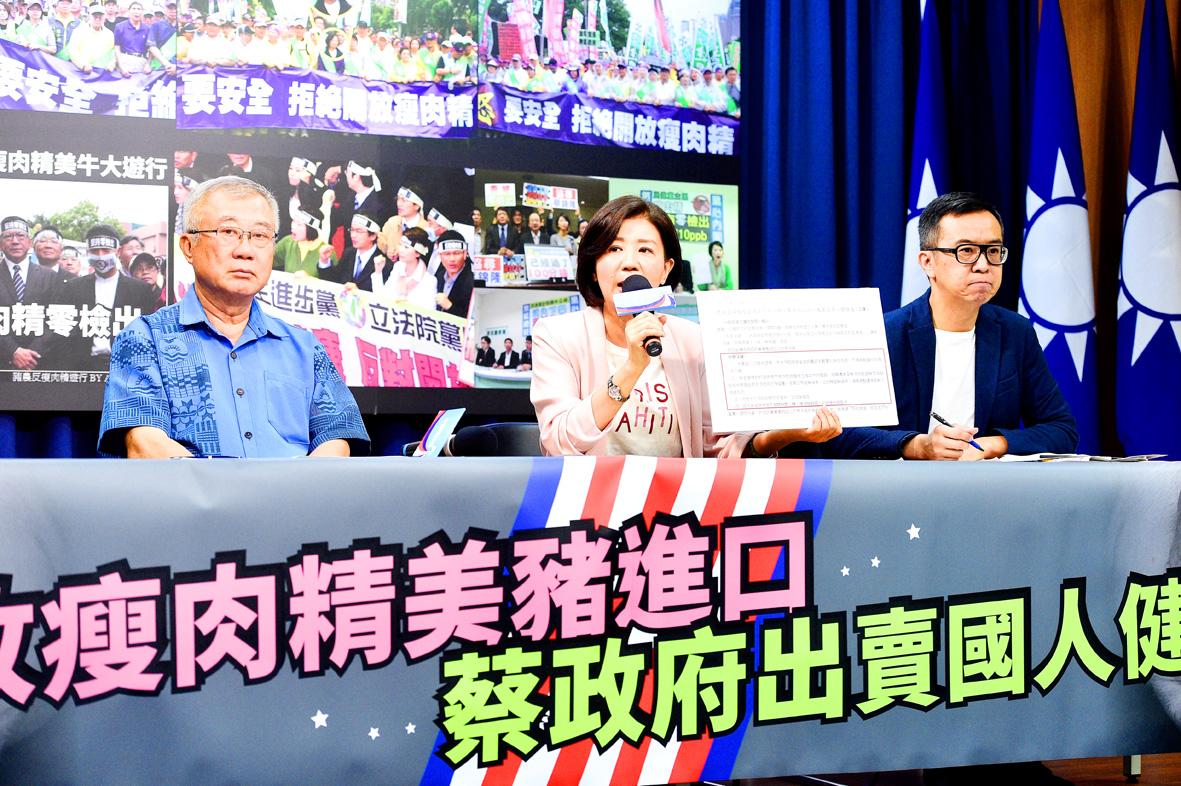The Chinese Nationalist Party (KMT) yesterday questioned why President Tsai Ing-wen’s (蔡英文) administration did not submit its decision to ease restrictions on the imports of US pork and beef to the Legislative Yuan for review.
Tsai on Friday announced that she had instructed government agencies — “under the prerequisite of ensuring the health of citizens, and in accordance with scientific evidence and international standards” — to set a “safe permitted value” of ractopamine in imported pork products, and to ease restrictions on the import of beef from US cattle aged 30 months or older.
“This decision is based on our national economic interests and consistent with our overall strategic goals for the future,” she said.

Photo: George Tsorng, Taipei Times
At a press conference at the KMT headquarters in Taipei, KMT Culture and Communications Committee chairwoman Alicia Wang (王育敏) said that the Tsai administration was “betraying” the public, and their health.
Tsai once criticized former president Ma Ying-jeou’s (馬英九) administration for not communicating with the public, the legislature or opposition parties, but she “unilaterally announced” the new policy without discussing it with those groups, Wang said.
She said that the Tsai administration had become an “autocratic dictatorial government,” and asked why the policy was able to bypass a review by the Legislative Yuan.
“Any important policy or legal amendment must be approved and reviewed by the legislature,” she said.
“Why? Because we are a democracy,” she added.
While the new policy “sacrifices the people’s health,” it is uncertain what national interest gains would be made, Wang said.
Chen Bao-ji (陳保基), who was the Council of Agriculture minister from 2012 to 2016, said it is “not enough” to label the imports, adding that importers should also be required to keep a record of imported meat, including where it is sold.
The president making the announcement before measures to manage the imports have been fully developed would have a “great impact” on the industry, he said.
“Is NT$10 billion [US$338.74 million] enough?” Chen said, referring to a commitment Tsai made to establish a “pig farming industry fund” to ensure that hog farmers’ income would not be affected.
The annual output value of the nation’s hog industry is NT$75 billion, Chen said.
Committee deputy chairman Huang Tzu-che (黃子哲) said it was “ironic” that while the central government is to allow imports of US pork containing ractopamine, domestic pig farmers would still be prohibited from using the leanness-enhancing drug.
Wang said that the KMT would not rule out street protests against the decision or other actions.
The Taiwan Youth Association for Democracy on Saturday in a post on Facebook also called on the government to hold off on allowing the imports.
Taiwanese, “especially the younger generation,” would bear any food safety issues future science might reveal, or any impact US pork imports might have on domestic hog farmers and the meat industry, the association said.
The association said it “strongly suggests” that the government postpone any decision on the matter until an inspection report has been released, the regulations have been completed, and when the public and stakeholders can accept the move.

A group of Taiwanese-American and Tibetan-American students at Harvard University on Saturday disrupted Chinese Ambassador to the US Xie Feng’s (謝鋒) speech at the school, accusing him of being responsible for numerous human rights violations. Four students — two Taiwanese Americans and two from Tibet — held up banners inside a conference hall where Xie was delivering a speech at the opening ceremony of the Harvard Kennedy School China Conference 2024. In a video clip provided by the Coalition of Students Resisting the CCP (Chinese Communist Party), Taiwanese-American Cosette Wu (吳亭樺) and Tibetan-American Tsering Yangchen are seen holding banners that together read:

UNAWARE: Many people sit for long hours every day and eat unhealthy foods, putting them at greater risk of developing one of the ‘three highs,’ an expert said More than 30 percent of adults aged 40 or older who underwent a government-funded health exam were unaware they had at least one of the “three highs” — high blood pressure, high blood lipids or high blood sugar, the Health Promotion Administration (HPA) said yesterday. Among adults aged 40 or older who said they did not have any of the “three highs” before taking the health exam, more than 30 percent were found to have at least one of them, Adult Preventive Health Examination Service data from 2022 showed. People with long-term medical conditions such as hypertension or diabetes usually do not

POLICE INVESTIGATING: A man said he quit his job as a nurse at Taipei Tzu Chi Hospital as he had been ‘disgusted’ by the behavior of his colleagues A man yesterday morning wrote online that he had witnessed nurses taking photographs and touching anesthetized patients inappropriately in Taipei Tzu Chi Hospital’s operating theaters. The man surnamed Huang (黃) wrote on the Professional Technology Temple bulletin board that during his six-month stint as a nurse at the hospital, he had seen nurses taking pictures of patients, including of their private parts, after they were anesthetized. Some nurses had also touched patients inappropriately and children were among those photographed, he said. Huang said this “disgusted” him “so much” that “he felt the need to reveal these unethical acts in the operating theater

Heat advisories were in effect for nine administrative regions yesterday afternoon as warm southwesterly winds pushed temperatures above 38°C in parts of southern Taiwan, the Central Weather Administration (CWA) said. As of 3:30pm yesterday, Tainan’s Yujing District (玉井) had recorded the day’s highest temperature of 39.7°C, though the measurement will not be included in Taiwan’s official heat records since Yujing is an automatic rather than manually operated weather station, the CWA said. Highs recorded in other areas were 38.7°C in Kaohsiung’s Neimen District (內門), 38.2°C in Chiayi City and 38.1°C in Pingtung’s Sandimen Township (三地門), CWA data showed. The spell of scorching